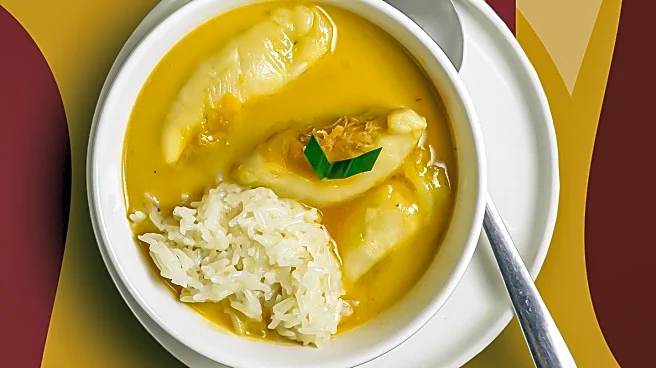What's Happening?
A vintage recipe for 'pancake soup' has gained attention online, sparking a debate over its appeal as a comfort food. The recipe, originating from a 1975 community cookbook, involves frying pancakes in bacon fat and adding them to a savory broth made with bouillon cubes. Shared on Reddit by a user named '_Alpha_Mail_', the recipe has intrigued many, with some recognizing it as a traditional German and Austrian dish known as flädlesuppe. While some users dismissed the idea, others appreciated its creativity and budget-friendly nature. The dish is noted for its resemblance to noodle soup, using leftover pancakes as a key ingredient.
Why It's Important?
The resurgence of this retro recipe highlights the ongoing interest in comfort foods and traditional dishes, especially those with cultural significance. It reflects a broader trend of rediscovering and sharing culinary heritage through social media platforms. The debate around the recipe underscores the diverse preferences in comfort food, with some valuing innovation and others sticking to conventional tastes. This discussion may influence food bloggers and chefs to explore and adapt traditional recipes, potentially impacting culinary trends and consumer choices in the U.S. food industry.
What's Next?
As the recipe continues to circulate online, it may inspire more people to try making pancake soup, leading to variations and adaptations. Food bloggers and chefs might experiment with different broths or ingredients, enhancing the dish's appeal. The conversation could also prompt further exploration of other traditional recipes, fostering a deeper appreciation for cultural culinary practices. Additionally, the recipe's popularity might encourage community cookbooks to be revisited, preserving and sharing historical culinary knowledge.
Beyond the Headlines
The pancake soup recipe's revival raises questions about the preservation of culinary traditions and the role of social media in cultural exchange. It highlights how digital platforms can serve as modern-day archives, allowing users to access and share historical recipes. This phenomenon may contribute to a broader understanding of cultural identity and heritage, as people connect over shared food experiences. The ethical dimension of adapting traditional recipes also emerges, as creators balance authenticity with innovation.









